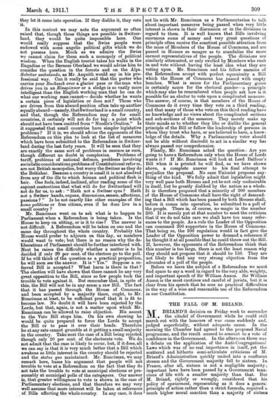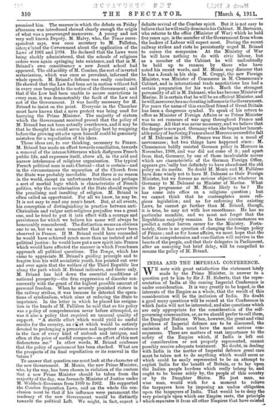THE FALL OF M. BRIA.ND.
BRIAND'S decision on Friday week to surrender , the citadel of Government while he could still march out with the honours of war came suddenly and, judged superficially, without adequate cause. In the morning the Chamber had agreed to the proposed Naval programme, and the result seemed to amount to a vote of confidence in the Government. In the afternoon there was a debate on the application of the Anti-Congregational Laws which was of no real importance in itself, yet the scattered and hitherto semi-articulate criticisms of M. Briand's Administration quickly united into a confluent stream and the Government majority fell to sixteen. In France, after all, sixteen is not a negligible majority ; important laws have been passed by a Government tena- cious of life with a smaller majority than that. But M. Bria.nd, rightly or wrongly, considered that his policy of apaismeni, representing as it does a general principle of action rather than a strict formula, required a. much higher moral sanction than a majority of sixteen promised him. The manner in which the debate on Friday afternoon was introduced showed clearly enough the origin of what was a prearranged manceuvre. A young and not very well known Deputy, M. Malvy, who, the Times corre- spondent says, was once secretary to M. Pelletan, interE elated. the Government about the application of the Laws of 1901 and 1904. He declared that the Laws were being slackly administered, that the schools of religious orders were again springing into existence, and that in M. Briand's own constituency a new Jesuit school had appeared. The old acidity of M. Combos, the sort of inverted sectarianism, which was once so prevalent, informed the whole speech. M. Briand's defence was really conclusive. He showed that the Law had been set in motion without fail in every case brought to the notice of the Government ; and that if the Law had been unable to secure convictions in every case, it was demonstrably the fault of the Law and not of the Government. It was hardly necessary for M. Briand to insist on the point. Everyone in the Chamber must have known that a mere pretext was being used for harrying the Prime Minister. The majority of sixteen which the Government received proved that the policy of M. Briand has not been actually overthrown, and it may be that he thought he could serve his policy best by resigning before the growing attacks upon himself could be genuinely mistaken for a repudiation of his ideas.
Those ideas are, to our thinking, necessary to France. M. Briand has made an effort towards conciliation, towards a removal of the intense bitterness which disfigures French public life, and expresses itself, above all, in the arid and narrow intolerance of religious organisation. The typical French political man is anti-Clerical—that is certain—and in the circumstances the separation of the Church from the State was probably inevitable. But there is no reason in the world, except an unfortunate tradition and perhaps a sort of morbid logic which is characteristic of French politics, why the secularisation of the State should require the penalising and insulting of religion. M. Briand is often called an opportunist. For all we know, he may be. It is not easy to read any man's heart. But, at all events, his conception of distinguishing in practice between anti- Clericalism and vulgar anti-religious prejudice was a great one, and he tried to put it into effect with a courage and persistence for which we believe his name will always be honourably remembered. The distinction seems an obvious one to us, but we must remember that it has never been observed in France. If M. Briand could have succeeded he would have achieved much more than an isolated act of political justice : he would have put a new spirit into France which would have affected the manner in which Frenchmen approach all political questions. The Temps, which has come to appreciate M. Briand's guiding principle and to forgive him his wild socialistic youth, has pointed out over and over again that the welfare of the Third Republic lies along the path which M. Briand indicates, and there only. M. Briand has laid down the essential conditions of national prosperity—the firm suppression of disorder con- currently with the grant of the highest possible amount of personal freedom. When he severely punished rioters in the railway strikes, it was because he detested the opera- tions of syndicalism, which aims at reducing the State to impotence. In the letter in which he placed his resigna- tion in the hands of M. Falliere,s he said that as his policy was a policy of comprehension never before attempted, so was it also a policy that required an unusual quality of support. "A sterile effort which would yield no useful results for the country, an ecort which would be entirely devoted to prolonging a precarious and impotent existence in the face of every kind of ambush and intrigue, and often at the price of sordid compacts—an effort of this sort disheartens me." In other words, M. Miami confesses that the policy of apaisement has been checked. What are the prospects of its final repudiation or its renewal in the future ?
To answer that question one must look at the character of the new Government. M. Monis, the new Prime Minister, who, by the way, has been chosen in violation of the custom that a new Prime Minister should be taken from the majority of the day, was formerly Minister of Justice under M. Waldeck-Rousseau from 1899 to 1902. He supported the Combos Separation Laws, and on the whole the con- clusion must be that if his influence were paramount the tendency of the new Government would be distinctly towards the political Left. We might, in fact, expect a definite revival of the Combos spirit. But it is not easy to believe that he will really dominate his Cabinet. M. Berteaux, who returns to the office (Minister of War) which he held five years ago, is the member of the Government from whom the leaders of Labour will expect most. During the recent railway strikes and riots he persistently urged M. Briand to coerce the companies.- At the Ministry of War he will have nothing to do with civic labour, but as a member of the Cabinet he will undoubtedly be held up to ransom by those who have noted his recent words, and M. Monis may discover that he has a Jonah in his ship. M. Cruppi, the new Foreign Minister, was Minister of Commerce in M. Clemenceau's Cabinet, and in international trade negotiations has had a certain preparation for his work. Much the strongest personality of all is M. Delcasse, who has become Minister of Marine. It is certain that he will be an efficient Minister, and he will,moreover,be a moderating influence in the Government. For years the name of this excellent friend of Great Britain has been a dangerous symbol. To speak of his return to office as Minister of Foreign Affairs or as Prime Minister was to set rumours of war agog throughout France and Germany. All that was never necessary, and we believe that the danger is now past. Germany when she began her lament- able policy of hectoring France about Morocco securedthe fall of M. Delcasse in 1904. France was then in a mood of nervousness ; but two things have happened since : M. Clemenceau boldly resisted German policy in Morocco in November, 1908, and war did not come of it ; and apart from that, Germany, by one of those incalculable moves which are characteristic of the German Foreign Office, appears gra:ually but definitely to have abandoned the old policy on its merits. No doubt M. Monis and M. Fallieres have done wisely not to have M. Deleasse as their Foreign. Minister, but we foresee no serious objection whatever in Germany to M. Delcasse as Minister of Marine. What is the programme of M. Monis likely to be ? He has come into office on a religious question ; but we cannot think that he contemplates more reli- gious legislation ; and as for enforcing the existing Laws, he cannot go further than M. Briand, though, it is true, he may act with less smoothness. He has no particular mandate, and we must not forget that the Republican majority remains. In these circumstances we predict a rather barren career for the Ministry. Fortu- nately, there is no question of changing the foreign policy of France ; and as for home affairs, we must hope that the belief in comprehension and conciliation will survive in the hearts of the people, and that their delegates in Parliament, after an annoying but brief delay, will be compelled to resume the policy of M. Briand.











































 Previous page
Previous page